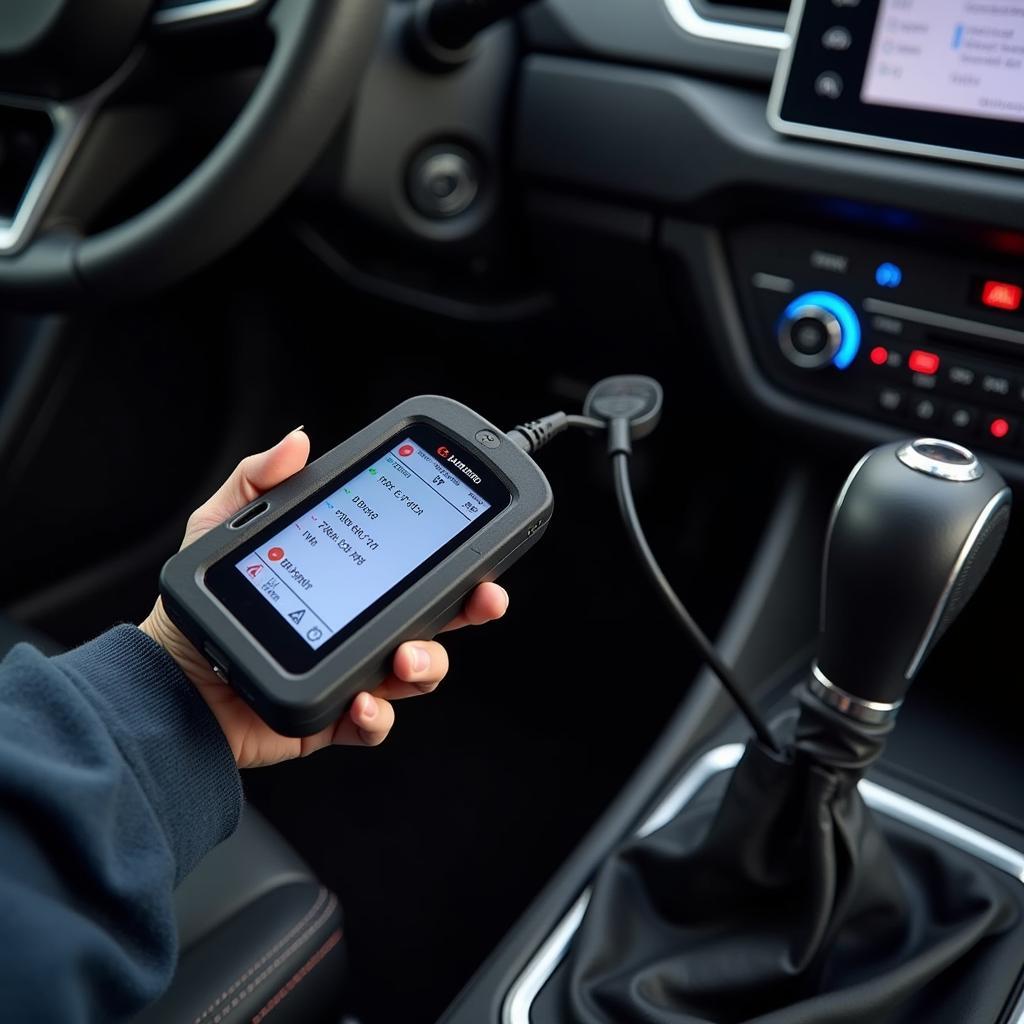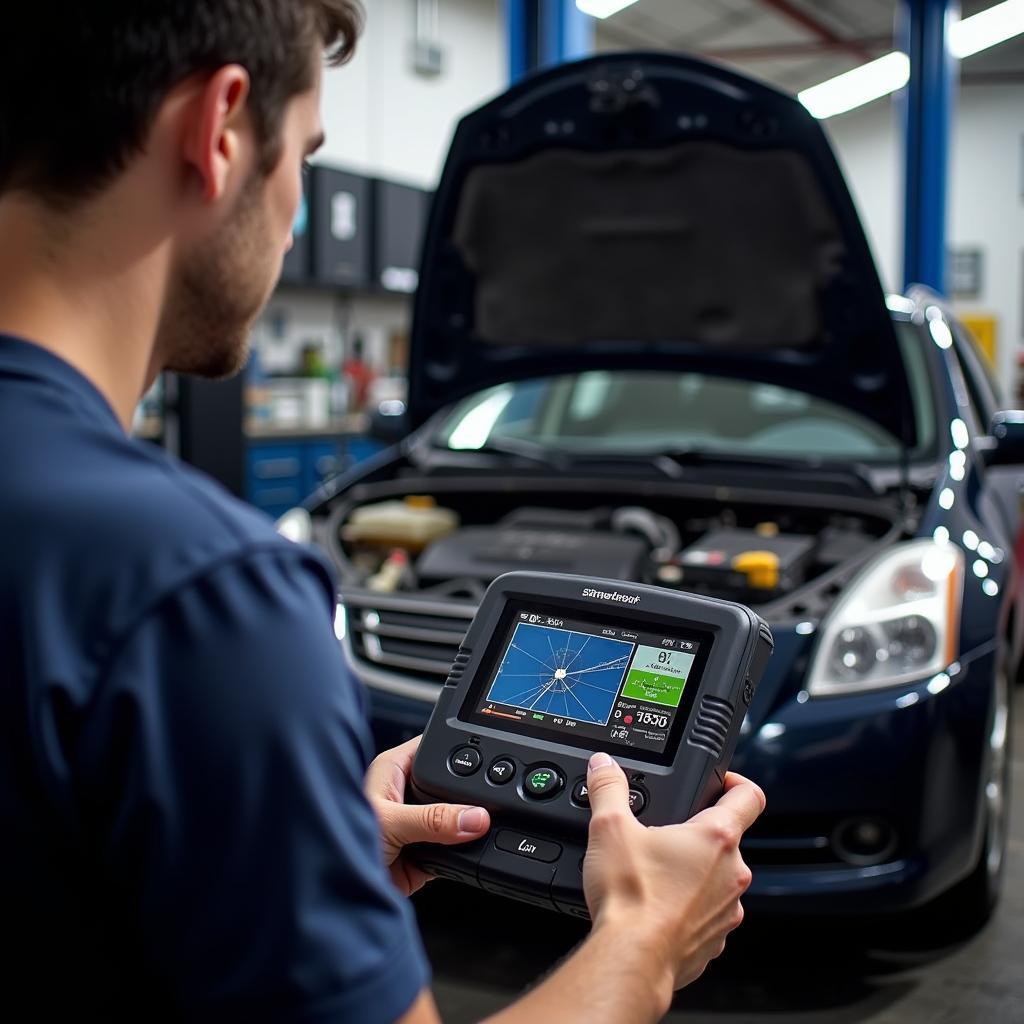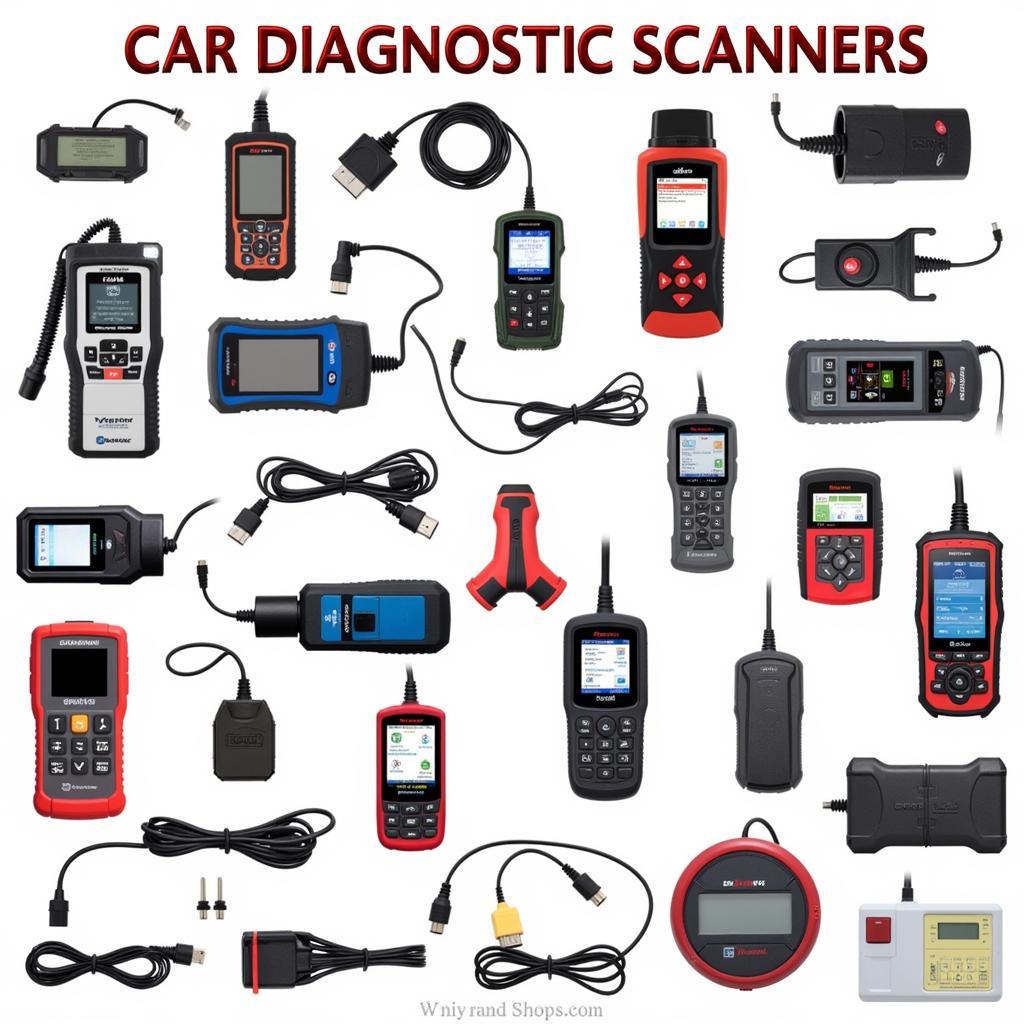A car diagnostic scanner is an essential tool for any car owner or mechanic. It allows you to communicate with your car’s computer, retrieve diagnostic trouble codes (DTCs), and understand the health of your vehicle’s various systems. But What Is A Car Diagnostic Scanner Used For exactly? This comprehensive guide will delve into the various uses of car diagnostic scanners and their benefits for car maintenance and repair.
Unveiling the Power of Car Diagnostic Scanners
Gone are the days when mechanics relied solely on their intuition and experience to diagnose car problems. Modern vehicles are equipped with complex electronic systems, often referred to as the Electronic Control Unit (ECU), which monitors and controls various aspects of the car’s performance. A car diagnostic scanner acts as a bridge between these systems and the user, providing valuable insights into the car’s inner workings.
How a Car Diagnostic Scanner Works
At its core, a car diagnostic scanner retrieves data from the vehicle’s ECU through a standardized system called OBD-II (On-Board Diagnostics, second generation). Almost all vehicles manufactured after 1996 are equipped with this port, typically located under the dashboard on the driver’s side. Once connected, the scanner can read and interpret the DTCs stored in the ECU’s memory. These codes are essentially standardized messages that pinpoint potential issues within the car’s systems.
 Car diagnostic scanner connected to a car’s OBD-II port
Car diagnostic scanner connected to a car’s OBD-II port
Common Uses of a Car Diagnostic Scanner
The applications of a car diagnostic scanner extend far beyond simply reading and clearing engine codes. Let’s explore some of the most common uses:
1. Diagnosing Engine Problems:
This is arguably the most common use of a car diagnostic scanner. By reading the DTCs related to the engine, you can identify issues such as:
- Misfires in specific cylinders
- Oxygen sensor malfunctions
- Problems with the catalytic converter
- Issues with the fuel system
2. Identifying Transmission Issues:
Car diagnostic scanners can also detect problems related to the transmission system, such as:
- Slipping gears
- Harsh shifting
- Torque converter problems
 Mechanic using a car diagnostic scanner to diagnose transmission issues
Mechanic using a car diagnostic scanner to diagnose transmission issues
3. Analyzing Emissions:
With growing concerns about environmental impact, ensuring your vehicle meets emission standards is crucial. Car diagnostic scanners can analyze emissions-related components and identify issues such as:
- Faulty oxygen sensors
- Evaporative emission control system leaks
- Problems with the EGR (Exhaust Gas Recirculation) system
4. Monitoring Various Systems:
Beyond diagnosing specific problems, car diagnostic scanners can also monitor the real-time performance of various car systems, including:
- Engine RPM
- Coolant temperature
- Airflow
- Throttle position
5. Resetting Warning Lights:
Once you’ve addressed the underlying issue that triggered a warning light on your dashboard, a car diagnostic scanner can be used to reset it.
Benefits of Owning a Car Diagnostic Scanner
Investing in a car diagnostic scanner can be highly beneficial for both car owners and mechanics. Here’s why:
- Save Money on Repairs: By identifying problems early on, you can address them before they escalate into major (and expensive) repairs.
- Avoid Unnecessary Trips to the Mechanic: A car diagnostic scanner empowers you to diagnose basic issues yourself, saving you time and money on unnecessary trips to the mechanic.
- Negotiate Better Repair Costs: Armed with knowledge about the problem beforehand, you can negotiate repair costs more effectively with mechanics.
- Improve Your Understanding of Your Car: Regularly using a car diagnostic scanner can give you a deeper understanding of your vehicle’s health and performance.
 Different types of car diagnostic scanners available in the market
Different types of car diagnostic scanners available in the market
Choosing the Right Car Diagnostic Scanner
The market offers a wide range of car diagnostic scanners, from basic code readers to advanced professional-grade tools. When choosing a scanner, consider the following factors:
- Your Budget: Basic code readers can be purchased for a relatively affordable price, while advanced scanners with more features come at a higher cost.
- Your Skill Level: If you’re a car enthusiast with some technical knowledge, a more advanced scanner might be suitable. However, if you’re a casual user, a basic code reader will likely suffice.
- Vehicle Compatibility: Ensure the scanner you choose is compatible with your vehicle’s make, model, and year.
Expert Insights
“A car diagnostic scanner is an invaluable tool for anyone who wants to take control of their car’s maintenance,” says John Smith, a seasoned automotive engineer at [Company Name]. “It’s like having a window into your car’s brain, allowing you to understand its needs and address potential issues proactively.”
Conclusion
A car diagnostic scanner is an indispensable tool for modern car owners and mechanics. From diagnosing engine problems to monitoring various systems, these devices empower you with the knowledge and control to keep your vehicle running smoothly. By investing in a car diagnostic scanner, you’re investing in the longevity and performance of your car, saving yourself potential headaches and costly repairs down the line.
FAQs about Car Diagnostic Scanners
1. Can I use any car diagnostic scanner on my vehicle?
No, not all car diagnostic scanners are universally compatible. You need to choose a scanner that’s compatible with your vehicle’s make, model, and year.
2. Will using a car diagnostic scanner void my car’s warranty?
No, using a car diagnostic scanner will not void your car’s warranty. In fact, many car manufacturers encourage the use of such devices for preventative maintenance.
3. Can a car diagnostic scanner fix problems with my car?
No, a car diagnostic scanner is primarily a diagnostic tool. It can identify problems but cannot fix them. Repairs still need to be carried out by a qualified mechanic.
4. What is the difference between a code reader and a car diagnostic scanner?
A code reader is a basic type of car diagnostic scanner that can read and clear DTCs. A full-fledged car diagnostic scanner offers more advanced features, such as live data streaming, system tests, and special functions.
5. How often should I use a car diagnostic scanner on my car?
It’s recommended to use a car diagnostic scanner at least once a year as part of your regular car maintenance routine. You can also use it any time your car displays unusual symptoms or warning lights.
6. Can I use a car diagnostic scanner to check the mileage of a used car?
Some advanced car diagnostic scanners can access the vehicle’s odometer readings, but it’s important to note that this data can be manipulated. It’s always recommended to get a pre-purchase inspection from a trusted mechanic before buying a used car.
7. Are there any free or low-cost car diagnostic scanner options available?
Yes, there are mobile apps that can connect to a Bluetooth OBD-II adapter and provide basic diagnostic information. However, these options might not offer the same level of functionality and accuracy as dedicated car diagnostic scanners.
Still have questions?
If you need further assistance or have any car diagnostic-related inquiries, please don’t hesitate to contact us via WhatsApp: +1(641)206-8880, Email: [email protected]. Our dedicated team of car diagnostic experts is available 24/7 to provide you with the guidance and support you need.

Leave a Reply